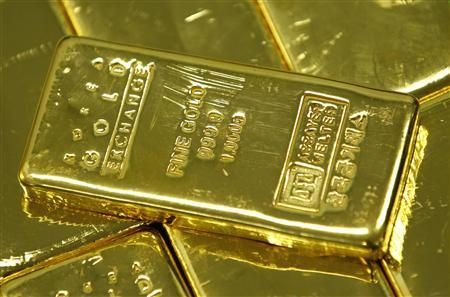Oil around $100 for 2 years, gold to scale new highs

Oil is likely to remain weak in the short term due to the sluggish global economy, while gold reaches new peaks on its increasing safe haven appeal and an expected further easing of U.S. monetary policy, a London-based fund manager said.
Angelos Damaskos, chief executive officer of Sector Investment Managers Ltd, said that OPEC producers prefer oil prices around $100 a barrel and that the group would act to cut production to support prices.
"In the short term, oil will remain weak because of all of this uncertainty of the global economy. But OPEC's stance in the statements made recently clearly indicates they would prefer oil to trade around $100 a barrel. So we think that is the medium-term average price for next couple of years," Damaskos told Reuters in an interview.
North Sea Brent crude futures were around $106.43 a barrel by 1445 GMT, falling from just below $117 at the end of July. U.S. crude was at $82.30 on Wednesday.
Damaskos said using the average of the two benchmarks would be fair.
"When oil prices were racing to $120-$125 at the beginning of the year, we had doubts if OPEC would actually increase the production to bring the prices down. It is not clear if OPEC actually has a spare capacity to increase production," Damaskos said.
"It is easy for them to cut production, and it is difficult to raise production," he added.
Gold, on the other hand, will continue to rise.
He said a third round of quantitative easing (QE3) in the United States is likely to follow the U.S. Federal Reserve's pledge to keep rates low for next two years, and it would be in a form of printing more money.
That would reduce the appeal of the reserve currency, prompting investors and central banks to buy more gold, he said.
Sector Investment had based its strategy on a gold price target of $1,800 an ounce by the end of this year. But that level was already reached on Tuesday, and spot gold hit an all-time high of $1,813.79 on Wednesday.
"We could possibly go much higher depending on how this problem develops," Damaskos said.
"Because the percentage allocation globally to gold and gold-related assets is still very low, there is a big chance that investors across the world will decide to move their assets to gold."
The Canadian dollar, Australian dollar, Swiss franc and Norwegian crown will remain strong against the dollar, he said.
DIFFICULT TO MANAGE
Although QE3 would be positive for long-only fund managers in general, it would boost inflation further, Damaskos said.
"Effectively, it will strengthen not only gold but also base commodities. That will feed into the manufacturing process and raise inflation," he said.
"That becomes a very difficult problem to manage. In traditional economics when inflation rises as it is now, you raise interest rates to stop it," he said.
Sector Investment manages energy and precious metals funds, including Junior Oils Trust and Junior Gold, specifically investing in smaller exploration and production companies in Canada, the UK and Norwegian North Sea and other areas with low political risks.
Its portfolio includes companies such as Canada's Caza Oil & Gas and Australia's Otto Energy.
Although Sector Investment was one of the best performing funds in the UK last year, it has suffered from the market volatility this year, Damaskos said.
Its assets under management are currently 80 million pounds ($129 million) compared with 110 million pounds at the start of the year.
Earlier this year it kept up to 30 percent of the oil fund in cash and then used some of that cash to buy oil company bonds to help reduce its exposure to volatility.
"Around February-March we invested about 15 percent of our fund in corporate bonds, and the rest we kept in cash until the end of April and the beginning of May," he said.
"Toward the end of May and the beginning of June, we exhausted the cash of the fund, so we decided to liquidate one third of the bond portfolio and used the cash from that to again buy into the lower prices (for oil company shares)," he added.
Bonds now account for about 14 percent of the oil fund, which the fund plans to liquidate in roughly the next two months to take advantage of lower share prices to invest in equities.
Cash now accounts for 3 percent of the oil fund, he said. ($1 = 0.619 British Pounds)
© Copyright Thomson Reuters 2024. All rights reserved.





















